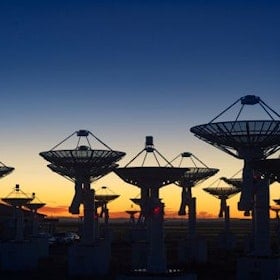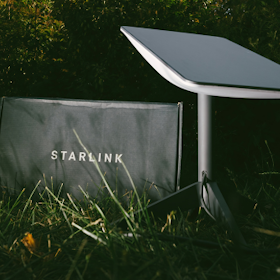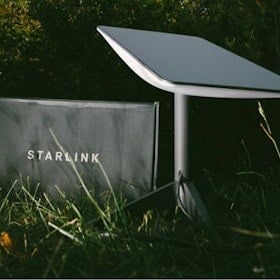Internet plans are riddled with fine print, including line after line of techy jargon. It's important to know what you're getting when you're shopping for a new internet plan, which is why we've created this guide.
So, what is DSL internet vs. cable internet? DSL (digital subscriber line) and cable internet are the most common internet connection types available. There are a couple of big advantages that cable internet has over DSL, including faster top-end speeds and better overall reliability.
That's not to say that DSL internet doesn't have its place. If you're looking for basic connectivity at a low monthly price, DSL could be a good fit.
Let's find the best internet connection type for you by comparing cable and DSL internet.
What's happening
WhistleOut Canada watches for trends in the internet industry. Here's what's going on this month:
- We've updated our list of the best internet providers in Canada, including several hot deals on high-speed plans.
- Starlink is now available in most of Canada, making their satellite internet service an enticing option for remote areas.
- We’ve got our eyes on the best cheap internet plans and the best internet plans for students.
Availability
If you're not sure what kind of internet you're using, it's likely a cable connection. Cable internet is widely available in urban and suburban areas. This availability is due to the connections running on existing cable TV lines (through the coaxial cables). With the lines already in place, cable internet is easy to install and a top choice for most homes.
On the other hand, DSL provides internet service through landline phone wires. As a result, it's also a very common internet connection type but not often the first pick due to speed limitations. DSL connections are available across most of Canada.
Winner: Tie
Price and value
If price is your primary concern, you may be best off with a DSL connection. You'll likely be able to save some money while still getting solid speeds from your Wi-Fi connection for basic uses like email, web browsing, and some light streaming.
Value-wise, cable moves ahead in this comparison. You can get faster speeds that are more reliable and often don't cost significantly more than DSL plans. If you need faster speeds than about 100Mbps, you'll have to forgo DSL entirely. Value decreases as you go for faster speeds, particularly as you approach and exceed a gigabit plan. At those speeds, we recommend checking for fibre internet in your area instead.
Bigger internet providers like Rogers will often charge more than smaller ones like oxio. While looking at your options, consider the price, speed, extra features, and discounts included in your plan.
Winner: Cable
Speeds
Cable offers a much higher maximum download speed than DSL. The maximum speeds that you can get from a cable internet plan can reach as high as 1.5Gbps, more than enough for most households. Speeds in the 100–300Mbps range are often among the most popular on plans, thanks to their combination of great latency and value. This sweet spot is also great for online gaming.
When it comes to DSL, maximum speeds cap around 75–100Mbps. These speeds are sufficient for simple tasks like light streaming and web browsing without hiccups. For the most basic uses, you can find cheap DSL connections with plans starting at as little as 6Mbps.
Upload speeds from a cable connection are often faster than those you'll see with a DSL connection. However, neither connection offers much beyond a 30Mbps upload speed at the top end. It's normal for the advertised speeds from an internet service provider to not match 1:1 with your real-world speed.
That's not to say that you won't have high-speed internet, but getting between 60–90% of the advertised speeds is normal.
Winner: Cable
Reliability
While cable internet features much faster top-end speeds than DSL internet does, it's in reliability that you see the gap widen. Both internet connection types have the potential to be bogged down. However, the slowdowns that a cable internet connection deals with are a bit easier to handle than the issues DSL faces.
One of the key things that can slow down a cable internet connection is a lot of internet traffic in your neighbourhood. As a result, peak usage times—usually between 5 p.m. and 10 p.m.—may include slower speeds for everyone in your area. Getting an internet package with enough speed to counteract this slowdown is one of the simpler but more expensive ways to mitigate this issue. Other strategies include:
- Doing large downloads overnight or earlier in the day.
- Limiting the number of devices that you have connected to your network.
- Using a wired ethernet cable instead of a Wi-Fi connection.
- Adding Wi-Fi extenders to your home network.
A reliability issue hindering DSL connections is the distance between the hub and your home. The further that the phone lines that carry DSL internet to your home travel, the more unreliable your internet connection will be. This factor makes DSL a risky option if you're unsure of where you're connecting to.
Winner: Cable
Providers
Many reputable internet service providers (ISPs) offer cable and DSL internet services. The availability of either will depend on your location, so search for an internet plan using your address to see which carriers are available to you.
When choosing a service provider, it's important to note a few things, such as:
- Do they supply you with a modem?
- What's the advertised internet speed?
- Do you get cable TV service?
- Does the provider have a good track record when dealing with internet users' issues?
Any internet provider can get you hooked up with internet access. Still, you don't want to be stuck looking for a new DSL or cable provider a few weeks from now because you have an incompatible modem or the cable speed in your area wasn't fast enough.
Some of the most popular ISPs that offer cable internet include Rogers, TekSavvy, and oxio. DSL plans are available from internet providers like VMedia, and Execulink.
Winner: Tie
Recap
Assuming all things are equal (or close to it), cable is the better choice. Cable offers faster speeds, more reliability, and better value. DSL can offer solid value, but you'll need to research the distance your internet wires are traveling to ensure that you won't be too frustrated by slow speeds.
Both cable and DSL internet have reliable service providers to choose from. When deciding between bigger and smaller carriers, check what discounts and features they include with your plan. Smaller providers, like oxio, often have lower prices, while larger providers, like Rogers, often have more features. You can read about the best internet providers in Canada before making your decision.
What about fibre internet?
If you're looking for the fastest internet in Canada, you'll want to purchase a fibre internet plan. Fibre is becoming more common in the country, with several different ISPs offering affordable fibreoptic options.
We're especially fond of Virgin Plus, which offers 50Mbps downloads and 10Mbps uploads, plus unlimited data, for just $40/month.
We also like Altima, who often pair their fibre plans with deals (including free modem rentals and monthly bill credits). You can grab 25Mbps downloads and 10Mbps uploads for $44/month.
DSL vs. cable: FAQs
Cable internet is better than DSL, with more faster and more consistent download and upload speeds. DSL internet, though, is often cheaper: if you're looking for basic internet service, DSL might be a solid option.
No, DSL and cable are not the same. Cable internet is sent through existing cable TV lines (more specifically, coaxial cables), while DSL service through landlines. Cable internet is, on average, faster and more consistent than DSL.
No, DSL is not obsolete, though it may appear that way in urban areas. Many remote areas still rely on DSL service for internet.
Yes, you can still have a landline with DSL.
Related Articles
Find Better Internet and Phone Plans
Hundreds of internet plans unpacked. All the facts. No surprises.
Internet Providers by Provinces and Territories
- Internet in Alberta
- Internet in British Columbia
- Internet in Manitoba
- Internet in New Brunswick
- Internet in Newfoundland and Labrador
- Internet in Northwest Territories
- Internet in Nova Scotia
- Internet in Nunavut
- Internet in Ontario
- Internet in Prince Edward Island
- Internet in Quebec
- Internet in Saskatchewan
- Internet in Yukon Territory






































